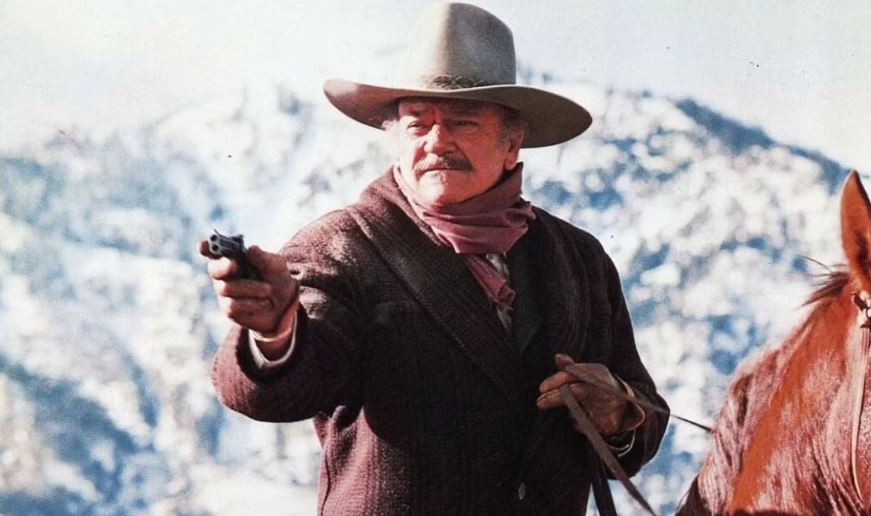John Wayne’s career in Western movies cemented him as one of the genre’s biggest icons, and he cemented his status by ending his Western career on a perfect note in The Shootist. While Wayne’s career included acclaimed roles outside of Westerns, like The Quiet Man and The Longest Day, he was best known for his gruff cowboy and lawman characters. In fact, his breakout role in Hollywood came with his terrific role in Stagecoach.
What followed was a huge collection of memorable Westerns from Wayne, like Red River, Rio Bravo, The Man Who Shot Liberty Valance, and his Oscar-winning turn in True Grit. However, in the 1970s, Wayne’s time at the top of the genre was ending with the emergence of Clint Eastwood as the new Western icon and a more violent, darker take on the genre. However, while his health was fading, Wayne managed to deliver one final and brilliant Western movie, as The Shootist capped off an incredible career.
The Shootist Brought An End Of John Wayne’s Era Of Western Movies

The Shootist Was John Wayne’s Last Movie Before His Death
1976’s The Shootist was not only the final Western of John Wayne’s career, but it also ended up being his final movie of any kind before his death in 1979. While it works as a great entry in the genre, it is even more effective as a celebration of Wayne’s legacy as a Western star and a fitting farewell. Wayne stars in The Shootist as famed gunfighter J. B. Books, a man with a legacy that is notorious and impressive, but who now faces an opponent he cannot defeat as he is diagnosed with cancer.
Books is a man known by everyone who is trying to come to terms with his own mortality as well as the idea that his Old West way of life is fading away with the beginning of the 1900s.
While Books has a reputation as a violent man, all he wants is to settle down in a small town to live out his remaining days in peace. The movie follows one day after another as Books grows closer to the wary yet kind boarding house owner, Bond Rogers (Lauren Bacall), and mentors her impressionable son, Gillom (Ron Howard). Meanwhile, others in the town seek to gain from his death in one way or another, as he seeks a way to die with dignity.
While Wayne had not yet been diagnosed with cancer, the movie mirrors his own story in a shocking way. Books is a man known by everyone who is trying to come to terms with his own mortality as well as the idea that his Old West way of life is fading away with the beginning of the 1900s. The movie further mixes fiction and reality as the opening establishes Books’ past by showing clips of a younger Wayne in some of his earlier Western movies.
Wayne had hoped to make another movie after The Shootist, but his declining health meant that this was his final movie. It works incredibly well in that regard, feeling like a farewell in many ways. Wayne even reunites with his The Man Who Shot Liberty Valance costar James Stewart, another acting legend who was on his way out of the business. It was not often that John Wayne died in movies, but his death scene in The Shootist felt purposeful. Even more purposeful was the fact that, even though Books died in the final gunfight, he did so proving he was the best.
John Wayne Went Out On A High With The Shootist

Wayne Gives One Of His Best And Most Layered Performances
It is unfortunate that The Shootist ended up being a box office failure when it was released in 1976, further signifying that John Wayne’s time as the top Western actor had come to an end. However, in the years after his death, The Shootist has become celebrated as one of the greatest final movies of any actor’s career as well as one of Wayne’s best performances. The reason the role works so well for Wayne is that it embraces his legacy while also allowing him to show a different side of himself.
The Shootist feels like a sign of Wayne understanding his time in Westerns was at an end and that he could give an honest performance that reflected the bittersweetness of that realization.
With the opening narration showing a montage of Wayne’s career in Westerns, the movie immediately makes the audience expect the typical Western tough guy role. Indeed, Books quickly gets held up at gunpoint by a bandit while on the road, confidently shooting the man down and showing no fear. However, in almost the very next scene, we see Book meet with Dr. Hostetler (James Stewart), and it is the most vulnerable Wayne has ever seemed on screen. He is filled with fear at facing death, pleading with the doctor to do something.
The movie continues balancing these aspects, as Books proves his legacy as a brilliant gunfighter is well-earned. He is a tough man who stands up to people who wrong him. At the same time, there is a scene in which Books slips in the bath and has to be helped by Bond, which is not something fans would ever expect to see in a John Wayne movie. He even describes himself at one point as “a dying man, scared of the dark.”
The fact that Wayne was in bad health atthe time of the movie only makes it all the more impressive that he committed himself completely to this performance. There is a perception that Wayne was too protective of his “macho” movie star persona, and there may have been some validity to that. However, The Shootist feels like a sign of Wayne understanding his time in Westerns was at an end and that he could give an honest performance that reflected the bittersweetness of that realization.
